Duelle Blu-ray Movie
HomeDuelle Blu-ray Movie 
Duelle (une quarantaine) / Blu-ray + DVDArrow | 1976 | 121 min | Not rated | No Release Date
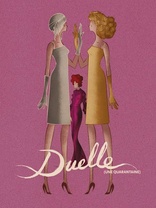
Price
Movie rating
6.5 | / 10 |
Blu-ray rating
| Users | 0.0 | |
| Reviewer | 3.5 | |
| Overall | 3.5 |
Overview
Duelle (1976)
The Queen of the Night battles the Queen of the Sun over a magical diamond that will allow the winner to remain on Earth, specifically in modern day Paris.
Starring: Juliet Berto, Bulle Ogier, Jean Babilée, Hermine Karagheuz, Nicole Garcia (I)Director: Jacques Rivette
| Foreign | Uncertain |
| Drama | Uncertain |
| Romance | Uncertain |
| Fantasy | Uncertain |
| Mystery | Uncertain |
Specifications
Video
Video codec: MPEG-4 AVC
Video resolution: 1080p
Aspect ratio: 1.85:1
Original aspect ratio: 1.66:1
Audio
French: LPCM Mono
Subtitles
English
Discs
Blu-ray Disc
Two-disc set (1 BD, 1 DVD)
DVD copy
Playback
Region A (B, C untested)
Review
Rating summary
| Movie | 3.5 | |
| Video | 3.5 | |
| Audio | 3.5 | |
| Extras | 1.0 | |
| Overall | 3.5 |
Duelle Blu-ray Movie Review
Reviewed by Jeffrey Kauffman May 30, 2017Note: This film is available as part of
The
Jacques Rivette Collection.
According to several sources Cahiers du cinéma is the oldest publication devoted to film still being published. This venerable journalistic
institution was founded in the early fifties by André Bazin, Jacques Doniol-Valcroze and Joseph-Marie Lo Duca and soon employed a coterie of
intellectuals who would ultimately go on to redefine first French film and finally world cinema itself. Among the now legendary names associated
with
Cahiers du cinéma are Éric Rohmer (the magazine’s first editor), Jean-Luc Godard, François Truffaut and Claude Chabrol. A 1954 article
by
Truffaut is often credited with opening the analytical floodgates for what later became known as “auteur theory”, and as should already be evident
given the names listed above, several of the writers employed by Cahiers du cinéma went on to become foundational figures in the
movement known as
Nouvelle vague, the French New Wave. It’s perhaps a little strange, then, that the name of Jacques Rivette hasn’t quite penetrated the
typical American filmgoer consciousness in the same way that (especially) Godard and Truffaut have, since Rivette began writing for the magazine
as
early as 1953 and in fact became its editor around a decade later. Rivette was also reportedly the first writer for the magazine later associated
with
the French New Wave to actually matriculate into feature film making, with his Paris Belongs to Us. That film reportedly began production in 1958, well before François Truffaut’s The 400 Blows came out in 1959 and/or Jean-Luc Godard’s
Breathless appeared in 1960, though it wasn’t finished and
screened until 1961, perhaps robbing Rivette of some bragging rights which would have otherwise been his.
Like some of his (future) New Wave
counterparts, Rivette wasn’t especially pleased with the mainstream French film industry of the 1950s and also like some of his cohorts he tended
to
lionize larger than life Hollywood directors like Alfred Hitchcock and John Ford. As structurally innovative as Godard has been, it’s arguable that in
some ways Rivette was even more anarchic in his approach toward “traditional” filmmaking, introducing some almost gargantuan running times
while also letting his casts (which were often almost absurdly large) to improvise their way through whole sequences. If Godard’s approach toward
deconstruction might be thought of as often a post-production technique, Rivette attacked some of the presumptions of less ambitious filmmakers
from a more foundational perspective, questioning the actual production process itself. This new collection from Arrow gathers together three
interesting efforts from Rivette spanning the years from 1976 to 1983. The first two films in this set, Duelle and
Noroît, were initially meant to be part of a four part series wherein Rivette sought to once again reinvent film “grammar”, though the
series met an unexpected ending when Rivette suffered a debilitating breakdown on the set of the proposed third film (which somewhat
confusingly
was initially supposed to be the first to be released and which rather enticingly
would
have starred Albert Finney and Leslie Caron). Rivette’s psychological turmoil made the ultimate follow up production of Merry-Go-Round extremely troubled, as evidenced by the fact that filming
began
in 1978 but wasn’t completed until 1981 (with the film not getting an official theatrical release until a couple of years after completion).
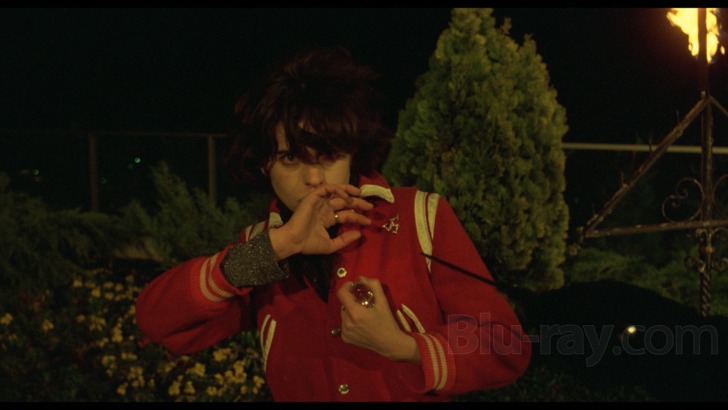
Narrative clarity isn’t always one of Rivette’s strengths, though it should be noted that this opaque quality is frequently intentional. Even some of the actors involved in Rivette films aren’t always exactly sure of what was going on in the films they were involved with, as evidenced by some of the supplements included on this set. As such, while one can summarize Duelle as a skirmish between two Goddesses, Viva (Bulle Ogier), daughter of the Sun, and Leni (Juliet Berto), daughter of the Moon, who are attempting to find the whereabouts of a magical jewel which will allow their visit to Earth to be extended indefinitely. It’s also perhaps salient to note that Rivette’s original conception for his proposed four film series involved a forty day time period that might be roughly thought of as Lenten, with a cohabitation of mortals and Gods (and/or Goddesses) playing into this spiritually “elevated” six week or so timeframe.
That intersection between Divinity and Mankind is on hand in Duelle, though Rivette’s disjunctive style doesn’t always make that clear. The humans in this case are siblings Pierrot (Jean Babilée) and Lucie (Hermine Karagheuz), who are kind of unwittingly enlisted to aid in the Goddesses’ quest. (The use of the name Pierrot, one of the totemic characters found in Commedia dell’Arte, may serve to only further muddy already roiling waters, though this Pierrot is suitably “persuaded” by lunar influences.) Despite a winding narrative that only reveals its course slowly (if at all), Duelle is at its core almost like a traditional mystery, some might even argue a kind of surreal noir, with various competing interests attempting to find the hidden jewel, which, once it is found, begins to exert a destructive power.
Though some newcomers to Rivette’s work might find this at least somewhat hard to believe, Duelle was not in fact improvised in the way other Rivette pieces were, though several reports state that the script for any given scene was often fashioned on the day of the shoot. There’s still a looseness to the proceedings, one supported however subliminally by some real improvising by musicians providing the score, a technique Rivette utilized in the other films in this set as well. Here pianist Jean Wiener is on hand in several scenes (somewhat anachronistically at times) offering what is almost a callback to the silent film era, when keyboard players would simply look at the screen and try to accompany the action as best as they were able.
Duelle Blu-ray Movie, Video Quality 
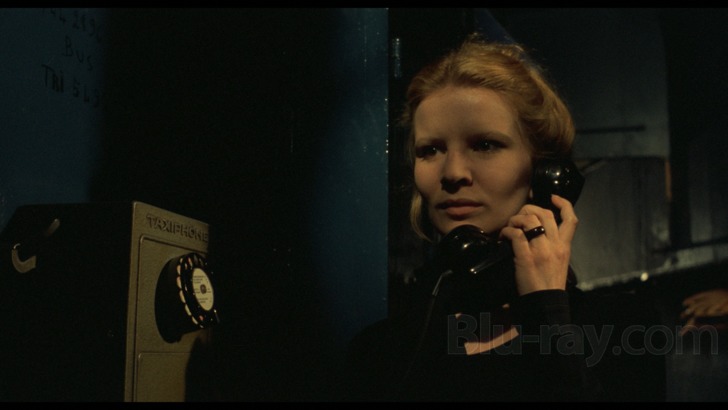
Duelle is presented on Blu-ray courtesy of Arrow Academy with an AVC encoded 1080p transfer in 1.85:1. Arrow's insert booklet contains this information on all three films in the Jacques Rivette set:
The original camera negatives were scanned, graded and restored at 2K resolution. The majority of the picture restoration work was conducted on Diamant Film Restoration systems, with Phoenix and Flame software used on selected sequences.As is mentioned in some of the supplements on this release, Duelle barely screened even in France and therefore it should come as no surprise that I never saw this theatrically, and so I admit up front I may be entirely off the mark with my reaction to this transfer's somewhat variable color space, but it is manifestly less natural looking at times than the other two films in this set. There's an intermittent yellowish undertone to some of the proceedings that tends to make flesh tones look jaundiced. Contrast isn't especially strong either at various moments, meaning some of the dimly lit material looks hazy at best. This is a nicely organic looking presentation for the most part (albeit a bit grittier in appearance than the two other films in this set), though there are a few exceptions (see screenshot 9). As Jonathan Rosenbaum mentions in his discussion of the films (included on the Merry-Go-Round disc), Rivette really doesn't favor close-ups that much, preferring to see midrange and wide shots where the performers' entire bodies can be viewed, and as such, fine detail levels are only sporadically evident. When close-ups are employed and especially when grading looks more natural and contrast is more defined, fine detail is actually quite good (see screenshot 4). There are also some fairly wide variances in sharpness, clarity and grain resolution, in changes that are somewhat similar to those I discuss in the Noroît Blu-ray review. The closing sequence in particular sees a rather wide variance in all those qualities.
Picture issues such as dirt, debris and scratches, torn frames, damaged splices, instability and mould were all corrected or minimised.
Colour grading was carried out using a P3 DCI colour space. 35mm original prints were used as a visual reference throughout by the colourist.
The original magnetic reels were too damaged for use, so the soundtracks were sourced from the original optical sound negatives and, in some cases, digital Betacam tapes produces in the 1990s. The majority of this work was carried out by L.E. Diapason in Paris.
Duelle Blu-ray Movie, Audio Quality 

Duelle features an LPCM Mono track in the original French with optional English subtitles. Both Duelle and Noroît sound just a bit boxier than Merry-Go-Round, with a slightly bright and brittle high end that's noticeable in such effects as what sounds like a train station under the opening credits, and to some extent some of the at time odd sounding musical elements. Dialogue comes through generally clearly, though (in a tendency shared with Noroît) there are occasional prioritization issues when music is playing (all of the films featured direct recording, so at least some of these imbalances are inherent to the source).
Duelle Blu-ray Movie, Special Features and Extras 
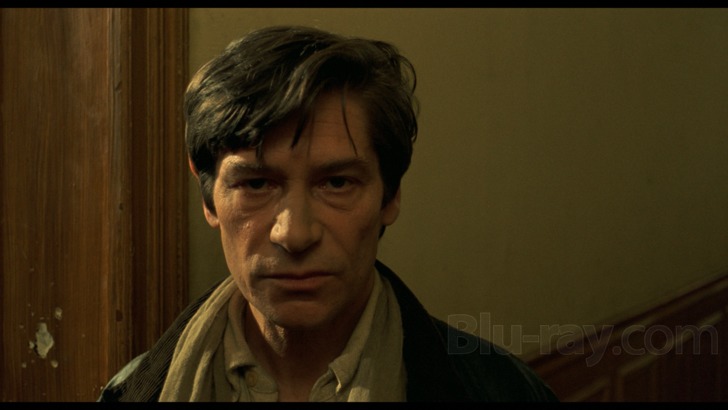
- Remembering Duelle (1080p; 10:59) is a relatively ironic title, given that interview subjects Bulle Ogier and Hermine Karagheuz don't always clearly recall what was going on in the film.
Duelle Blu-ray Movie, Overall Score and Recommendation 
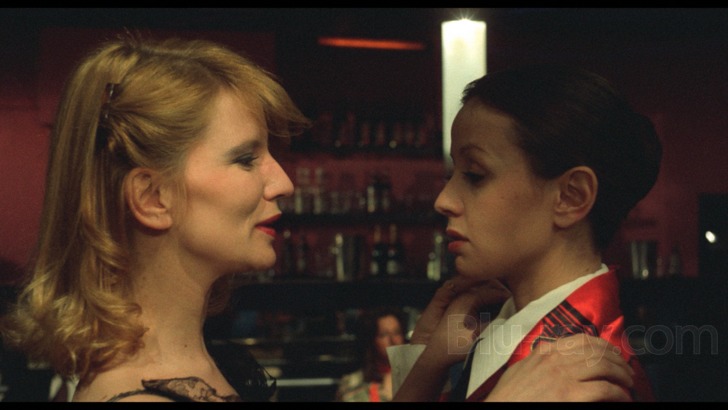
Duelle is probably too intentionally opaque to ever function fully as a mystery or thriller, but it has mood to spare and it casts a rather hallucinatory spell, at least for those patient enough to let that spell take hold. This had the least pleasing video appearance to my eye of the three films in this set, and audio is also a little boxy sounding, but with those and general caveats in mind, Duelle comes Recommended.
Similar titles
Similar titles you might also like
(Still not reliable for this title)

Noroît
Noroît (une vengeance)
1976

Merry-Go-Round
1981

Boy Meets Girl
1984

Betty Blue
37°2 le matin | Director's Cut
1986

The Apartment
L'appartement
1996

Three Colors: Red
Trois couleurs: Rouge
1994

The Earrings of Madame de...
Madame de...
1953

Out 1
Out 1, noli me tangere
1971

The Man Who Loved Women
L'homme qui aimait les femmes
1978

Let the Sunshine In
Un beau soleil intérieur
2017

Saraband
2003

Masculin Féminin
1966

The Lovers
Les amants
1958

The Green Ray
Summer / Le rayon vert
1986

Wings of Desire 4K
Der Himmel über Berlin
1987

Full Moon in Paris
Les nuits de la pleine lune
1984

Claire's Knee
Le genou de Claire
1970

L' Argent
1928

A Tale of Winter
Conte d'hiver
1992

Millennium Mambo
千禧曼波 / Qian xi man bo
2001